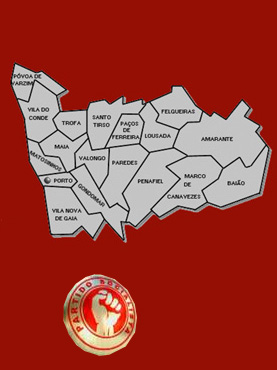Fonte: Margens de erro
PSD: 32,5%
PS: 29,4%
BE: 8,9%
CDU: 8,9%
CDS-PP: 3,3%
Em 10 sondagens, esta é a primeira em que o PSD aparece à frente, embora ligeiramente, ou seja dentro do conceito de empate técnico. Dos 807 da amostra falta saber quantos efectivamente responderam pois podem ser, por exemplo, menos de metade, como tem acontecido noutros inquéritos deste barómetro. Se o número de respostas for, pelo contrário, significativo, estes resultados podem significar uma tendência muito preocupante para o PS. Em qualquer caso, domingo teremos a grande sondagem, a mãe de todas as sondagens. (PB)



3 comentários:
Portugal's economy
Socratic dialogue
Apr 30th 2009 | LISBON
From The Economist print edition
A lousy economy, glum voters—yet the prime minister may still win in October
THE Portuguese are among the glummest people in Europe. According to a Eurobarometer poll, 92% see the economic situation as bad; fully 95% are depressed about their job prospects; and over half are “dissatisfied with the life they lead”. Within the European Union, only easterners from Hungary and Bulgaria are similarly morose. Why the pessimism?
José Sócrates, the Socialist prime minister, could offer reasons to be more cheerful. Portugal has not experienced a big property bust like those in Spain and Ireland. Its exporters are tapping into new markets, particularly Angola and Brazil. Angola, where GDP is growing at close to 10% a year, is now Portugal’s fourth-biggest export market. By avoiding most toxic assets, the banks have stayed relatively sound. And by pushing renewable energy, the government has made Portugal a model of how to stimulate the economy and fight climate change. Investments worth €14 billion ($18 billion) will create 22,000 jobs by 2020, by which time Portugal will produce over 60% of its electricity from clean energy, way above the EU target of 20%.
Yet it is hard to cheer people with such arguments when overall economic performance has been so poor. This year GDP is expected to contract by 3.5%, lifting unemployment to about 8.5%. These are hardly cheering figures, but the real problem is that they come after a decade of below-average growth. GDP per head has fallen from almost 80% of the EU average ten years ago to just 75% in 2008. Far from catching up, Portugal has fallen further behind—unlike others in the EU (see chart).
Part of the problem was that joining the euro in 1999 pushed interest rates too low. The Portuguese borrowed heavily to buy houses, cars and airline tickets. Easy credit and rising wages sucked in imports, swelling the current-account deficit to 12% of GDP last year. Productivity failed to keep up. Instead of compensating for a limited domestic market, exports have remained stubbornly stuck at 30% of GDP—less than in most comparable small EU countries.
To improve its performance, Portugal needs more flexible labour laws, less bureaucracy, a better educated workforce, more competition and a smaller state. As the IMF states in a recent report, the country’s fundamental problems are domestic, not global, in nature. But political leaders find reforms hard to push through. Despite this, Mr Sócrates may well win the election due in October, even if the Socialists lose their absolute majority.
The prime minister has his own reasons to be less than cheerful, however. In what he calls a “black campaign of selected and manipulated leaks” designed to damage his electoral chances, the media have spent months looking into a supposed corruption scandal over the approval of a new shopping centre in 2002, when Mr Sócrates was environment minister. Mr Sócrates denies any wrongdoing; the judicial authorities have said no politician is involved. But the fact that an investigation begun in 2005 is still going shows the inefficiencies and delays of the judicial system, another failing that harms competitiveness, deters foreign investment—and leaves the Portuguese despondent.
Ganhar eleições, mais do que meter Deputados...é ter mais votos do que nas anteriores eleições...
A Abstenção vai ser Recordista...
Não tenho nada a ver com o PSD, mas é preciso que a demagogia e o populismo do intelectual orgânico do PS, cabeça de lista ao Parlamento Europeu, e José Sócrates recebam um sinal de que os eleitores não são burros, não vão atrás da "conversa-de-chacha".
É também necessário que os "boys" do PS começem a compreender que um partido não é a mesa do orçamento dos contribuintes, onde vão buscar umas migalhas. Um partido só se justifica pelo saber tomar "partido" por ideias que orientem projectos para servir o bem-comum. E este PS já nada tem a ver com as ideias que, com muita luta, configuraram o ideal socialista.
A traição aos ideais paga-se caro!
Enviar um comentário